To paraphrase Calvin Coolidge: The chief business of British Columbia is British Columbia.
Construction and real estate add up to a hugely disproportionate share of the Cascadian province’s economy, Bloomberg Businessweek noted Saturday, as BC voters went to the polls in dozens of municipal elections whose overriding issue was housing.
Those elections indicated that BC’s housing policy may be brewing another big shift.
There’s no mystery why the business of allowing more people to become British Columbian, without simultaneously preventing anyone from remaining British Columbian if they want to, is both the cornerstone of the province’s economy and its core political issue.
The province is comically beautiful. Its cities, especially Vancouver and its inner suburbs, are international beacons of multiethnic openness, harmony, and prosperity. In April, former Vancouverite Jarrett Walker told the Seattle Times, accurately, that Vancouver is the only city in North America to successfully develop in the modern era around mass transit, just as all pre-1940 cities had.
All that is to say: BC is an extremely nice place. It’s also to say the stakes in Saturday’s municipal elections were high.
Last month, Vancouver became the first North American city to end the most extreme (though extremely common) variety of housing ban: On the way out the door, its local center-left Vision Vancouver party re-legalized duplexes on almost every lot where a detached home is allowed.
The suburbs, meanwhile, have seen tenants in rent-controlled low-rises evicted for new towers and unable to find new homes, even as some homeowners lucky enough to own a patch of the region’s scarce land have opposed the suburbs’ broad legalization of “secondary suites” (BC’s term for attached accessory dwellings).
It’s added up to quite a fight. And when it’s happening in Cascadia’s greenest metro area—as close to what the future could look like as you’ll find anywhere—it’s worth learning from.
Vancouver: A pro-housing mayor will lead a splintered left
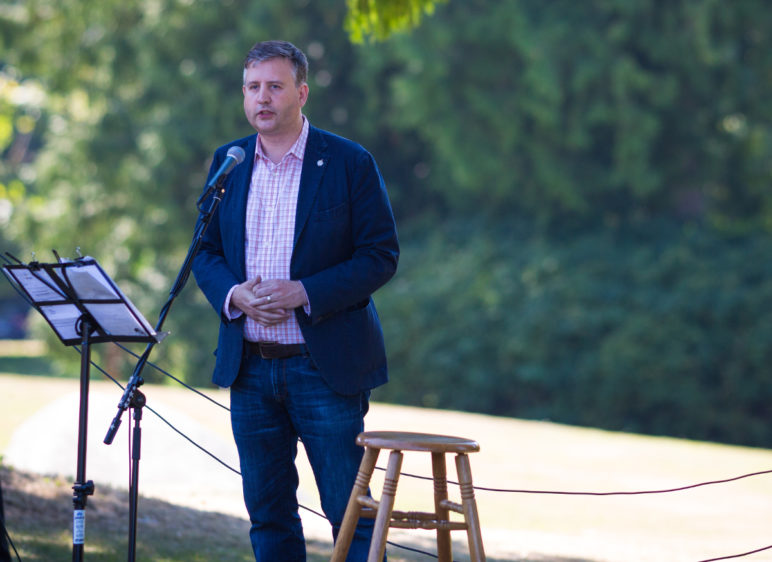
Lonely voice? Future Vancouver mayor Kennedy Stewart speaks at a 2014 event. Photo by Mark Klotz, used under creative commons.
Vancouver’s five leading mayoral candidates sum up its political spectrum on housing production.
They were a vocally pro-car advocate for south-side homeowers; a wishy-washy center-right businessman; a center-left academic who called for upzoning low-density lots for four-story co-ops; a union-backed Member of Parliament who promised both taxes on foreign homeowners and lots of mixed-income housing; and a build-build-build technocrat who called for the city to look “more like Paris than Saskatoon.”
The fourth candidate on that spectrum, former Burnaby MP Kennedy Stewart, squeaked past the businessman, Ken Sim. Each took about 29 percent of the vote. Academic Shauna Sylvester trailed them with 21 percent.
The two most extreme candidates, Wai Young and Hector Bremner, took distant fourth and fifth places, with 7 and 6 percent of the vote respectively. (For those keeping track, that’s roughly a 56/35 split in favor of accelerating housing production, not counting an array of more minor candidates. It’s also yet another argument for ranked-choice voting, which my colleague Kristin Eberhard has been studying; winning with 29 percent of the vote seems barely democratic.)
As mayor, Stewart seems likely to resemble his predecessor, Gregor Robertson, a champion of the city’s lightning duplex re-legalization and of a broader effort, up for debate next year, to re-legalize other sorts of “missing middle” homes.
But Vancouver’s new city council, all elected Saturday in a single “pick any 10” contest, will drive the shift in city politics. (Kristin would want me to note that this bloc voting system is inherently less representative than multi-winner ranked-choice voting would be.)
Five are from Vancouver’s center-right NPA. The other five are split among three Greens, one from the social-democratic OneCity party and one from the democratic socialist COPE party.
As the Georgia Straight’s Charlie Smith notes, the Green councilors are likely to be swing votes on housing issues. In recent years, Vancouver’s local Greens have been pro-housing in the abstract but prone to oppose specific proposals or to call for affordability mandates—50 percent below-market-rate homes in every multifamily building, for example—that would, without massive new subsidies, amount to near-bans on major housing construction.
“It looks like the Greens will now have to come down from that carefully constructed fence if they are to support Kennedy in his ambitious targets for housing supply,” Smith wrote Monday.
There’s also the possibility, of course, that Stewart could build a bridge to one or more NPA members on housing issues. Colin Stein, managing editor for the Vancouver urbanist blog Price Tags, told me Monday he saw almost no chance of any NPA councilor breaking ranks with the others.
If, on the other hand, the NPA and Greens were to vote as a bloc on housing (even if they describe themselves as having different reasons to say “no”) they could call all the shots—and even overturn the recent duplex legalization over the new mayor’s objection.
Globe and Mail reporter Frances Bula, though, told me Tuesday that she’d asked Green leader Adriene Carr about this possibility last month. Carr said her party wouldn’t go so far as to reverse the duplex legalization after its passage.
Suburban turmoil: A ‘pause’ on new building?
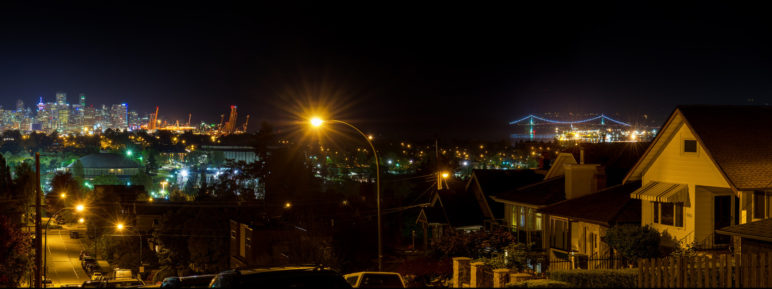
Looking west from the Vancouver-Burnaby border. Photo by Jerry Meaden, used under creative commons.
Outside Vancouver, meanwhile, British Columbia may have just seen the closest thing in years to a revolt against housing growth by suburban voters.
The trend wasn’t universal or uniform. Pro-housing candidates easily defeated loudly anti-housing ones in North Vancouver and across the strait in Victoria, while anti-housing challengers won in the smaller suburbs White Rock and Port Moody. In Richmond, whose new Skytrain line has brought the region’s latest surge of suburban condo towers, the longtime mayor cruised to re-election.
But Burnaby and Surrey, two large cities to Vancouver’s east and southeast with 20 Skytrain stations between them, both handed big victories to mayoral candidates who promised a “moratorium” (Burnaby) or “pause” (Surrey) on new housing.
Burnaby: Anger at ‘demovictions’ from rent-controlled homes
In Burnaby, voters kicked out local institution Derek Corrigan, a five-term incumbent who was unusually sharp-tongued in his support for new condo towers.
Corrigan publicly compared people evicted by redevelopment from rent-controlled far-below-market apartments near transit to “eggs” that needed to be broken for the sake of a transit-oriented “omelet.” In a different interview, Corrigan explained his opposition to a homeless shelter by saying (via a reporter’s paraphrase) that “many are the type of folks who, if they found you dying on the sidewalk, would pull out your gold fillings.”
He ended up being trounced by a retired firefighter named Mike Hurley, described by the editor of local newspaper Burnaby Now as “mildly affable” and a “virtual unknown” who “didn’t exactly light it up when it came to big policy ideas.”
But Hurley did promise something Corrigan wouldn’t: “a moratorium on developments … until accommodation at the same rent levels can be found for residents.”
“One by one, the buildings fell, people were dumped out into the streets and Corrigan seemed unconcerned,” writes Burnaby Now‘s Chris Campbell. “Even worse, he whined about how his hands were tied.”
Now, it may be Hurley’s hands that wind up tied: Voters kicked out Corrigan but returned Corrigan’s governing allies to near-complete control of Burnaby’s city council. It’s anyone’s guess where housing policy lands under Hurley, though Burnaby politics seem certain to be different without Corrigan.
Surrey: A pro-housing politician changes his tune
After decades of rapid growth inward and upward, British Columbia’s No. 2 city (and, at 525,000 residents, Cascadia’s No. 4) has been on track to become BC’s largest around 2040.
That’s still likely. But slower growth is exactly what some residents just voted for in this huge suburban city that grazes the US border.
Housing was one of exactly three issues that resurrected the political career of Doug McCallum, 74, who already served as Surrey’s mayor from 1996 to 2005. Generally pro-housing in his earlier career, this year he recruited a slate of candidates who vaguely promised a “pause” on development the party said had “clearly been too fast.”
“Developers should expect to create some affordable housing options in exchange for the density increases,” the platform said.
McCallum, who focused more on crime and transportation than housing in his personal campaigning, took 41 percent of the mayoral vote, sweeping aside all comers including the governing party’s Tom Gill, his closest runner-up with 26 percent. McCallum’s handpicked slate won seven of eight council seats. (My colleague Kristin’s analysis about the dangers of first-past-the-post executive races and bloc voting comes to mind again.)
Daphne Bramham, a columnist for the Vancouver Sun, said in a video analysis Sunday that she wasn’t sure McCallum would stick with this campaign theme for long.
“I don’t think we’ll be able to answer affordability questions very easily, particularly if Doug McCallum says ‘no more development here,'” she said. “When they really sit down in those chairs, in those councils, and they have people saying ‘I’m losing my home’ and they start to see a rise in homelessness, and they start to have tent cities, they may decide that maybe there’s something good about developing affordable housing.”
All signs point to the same tool: Inclusionary zoning
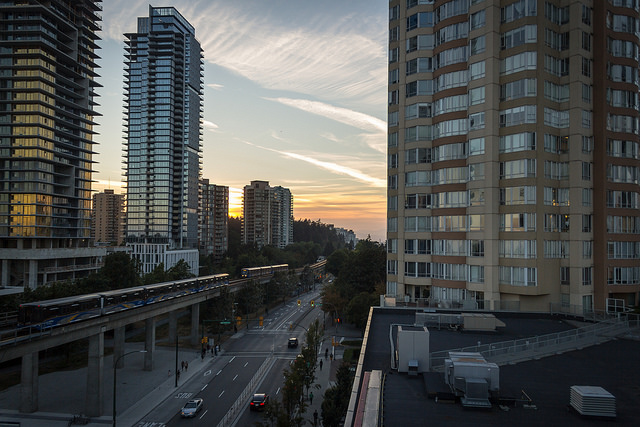
Condo towers near Burnaby Metrotown’s skytrain station. Photo by Kevin Boyd, used under creative commons.
Bula, a veteran housing reporter in Vancouver, said it’d be easy to misinterpret Saturday’s elections.
“In Vancouver and Burnaby for sure, it’s not about stopping development,” she said. “It’s about wanting to produce a new kind of development that has some mechanism for including apartments that can be rented for less than $2,000 a month.”
In other words, it’s about inclusionary zoning.
But Bula said she doesn’t think any proponents of inclusionary zoning have done the math to figure out what 25,000 new below-market-rate homes, for example, would really cost, how the public or private sectors would pay for them, or what might happen if out-of-balance affordability mandates were to shut down housing production completely.
“I’m actually going to start phoning developers this week to ask them about all of this,” she said.
So for British Columbians, the stakes remain high. Blocking homebuilding could trigger a double-barreled economic disaster, if home costs spiraled further up even as the housing industry withered.
But (as Bloomberg Businessweek also mentioned in its Saturday report) the main obstacle to diversifying the province’s economy to include more green tech, advanced manufacturing or tourism seems to be … housing prices.
One way or another, a change has got to come.

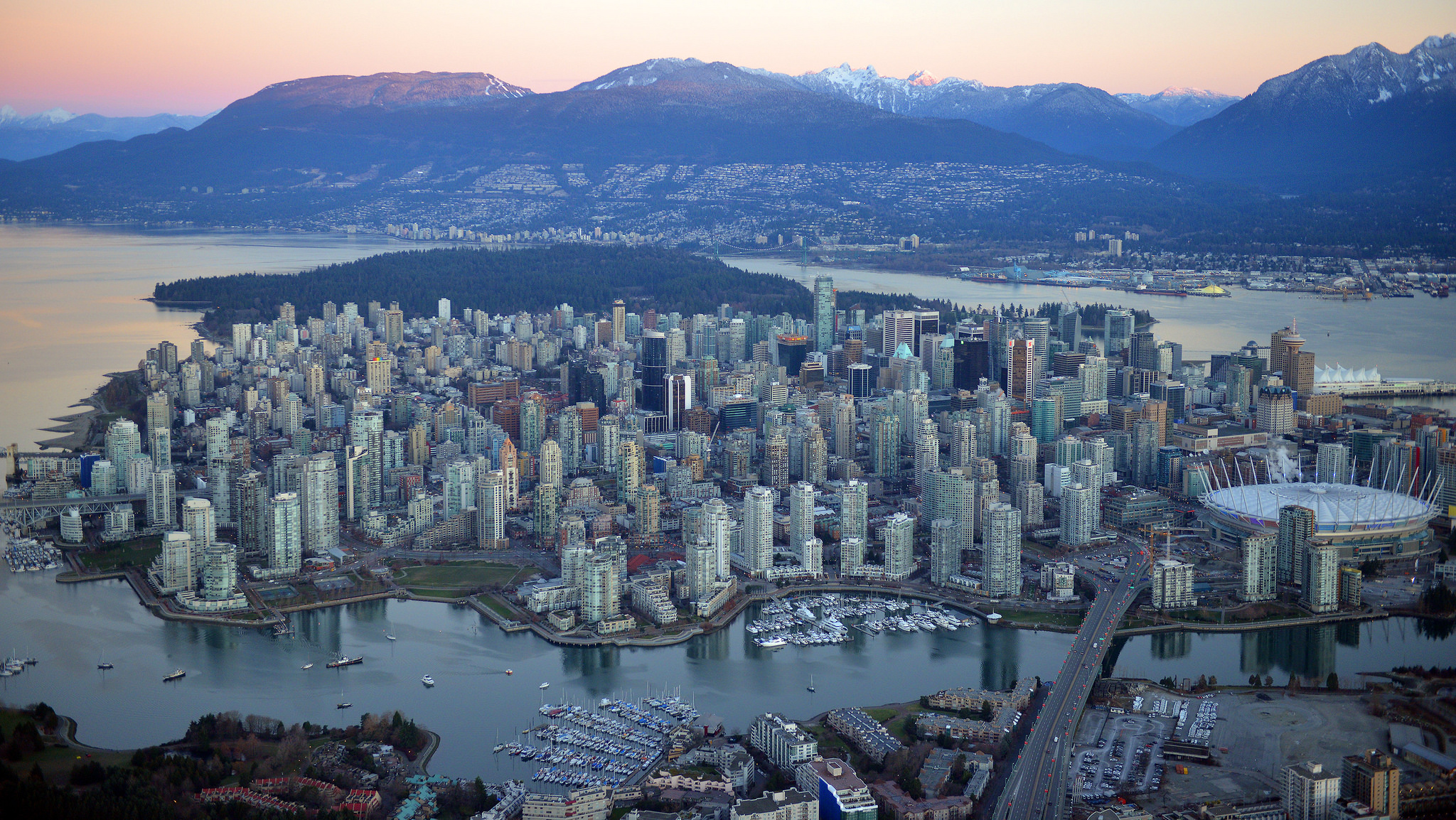
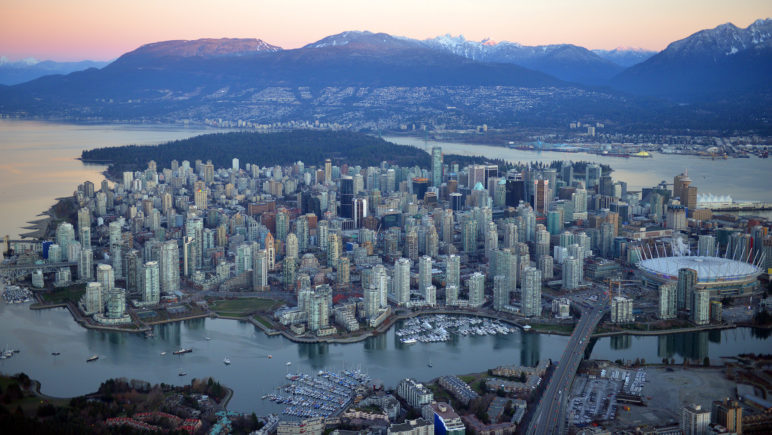



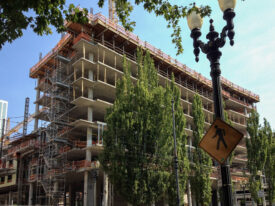

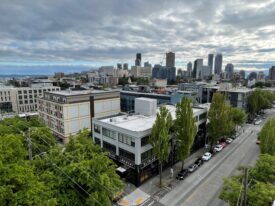

Kelly
I’d like to clarify to the author that “North Vancouver” is comprised of 2 municipalities and the larger of the two, the District, spoke loud and clear https://www.nsnews.com/news/former-councillor-mike-little-elected-new-district-of-north-vancouver-mayor-1.23470105 at the polls and elected a slower-growth mayor with 60% of the votes and a council equally concerned with affordable housing in the municipality.
Michael Andersen
You’re correct, of course! Thanks for the note.
Kelly
You are welcome. Thanks for the article!